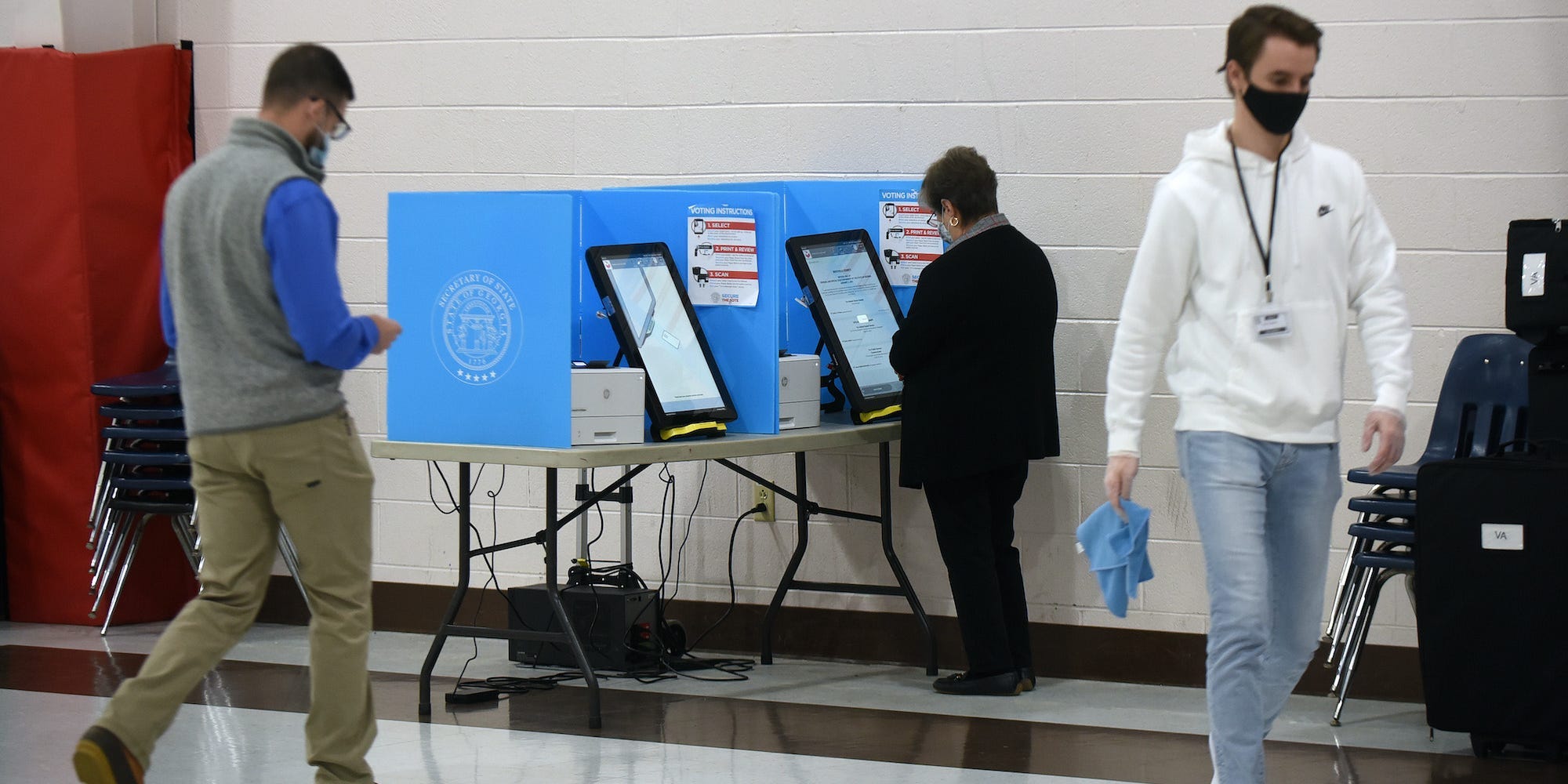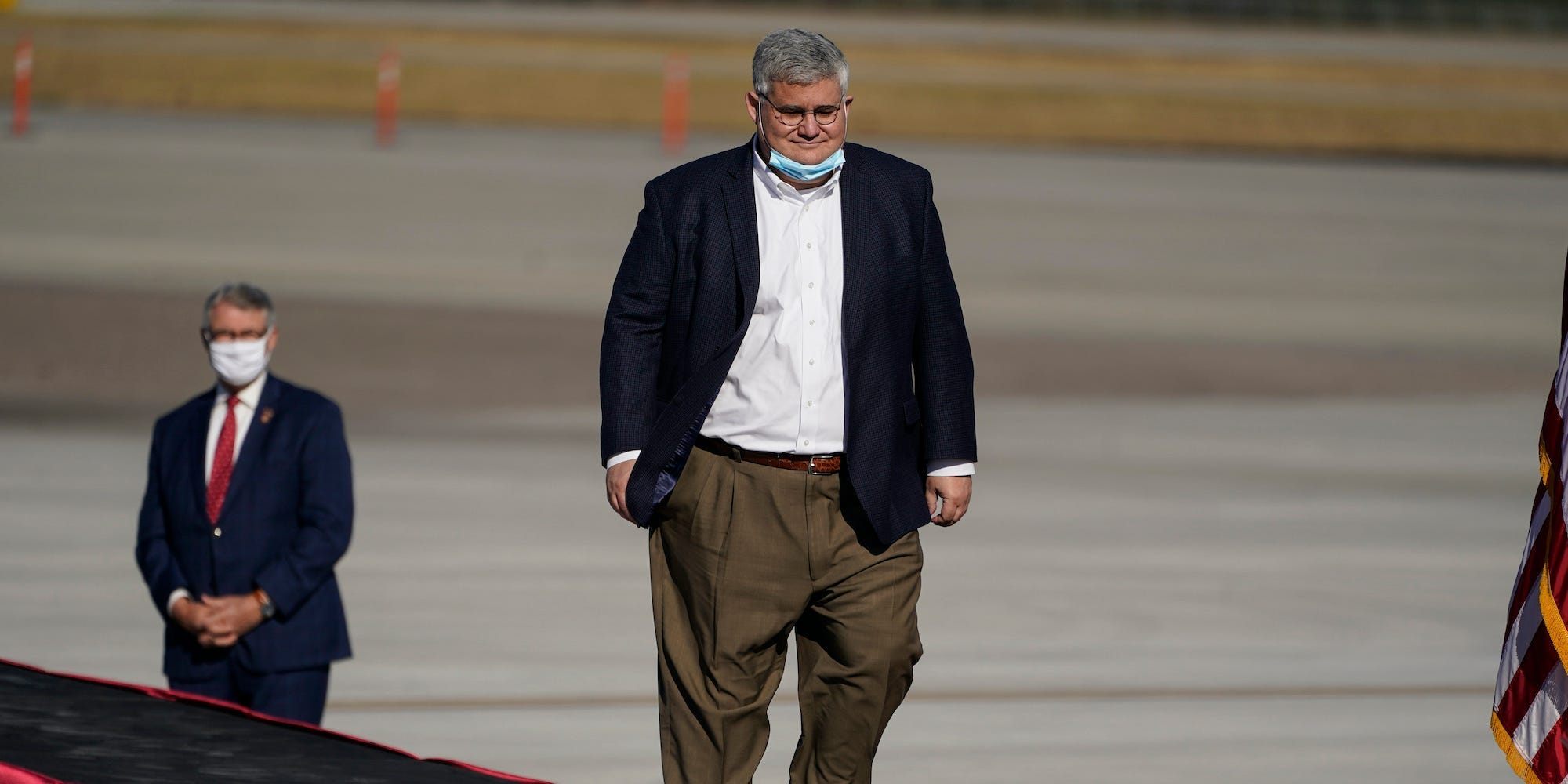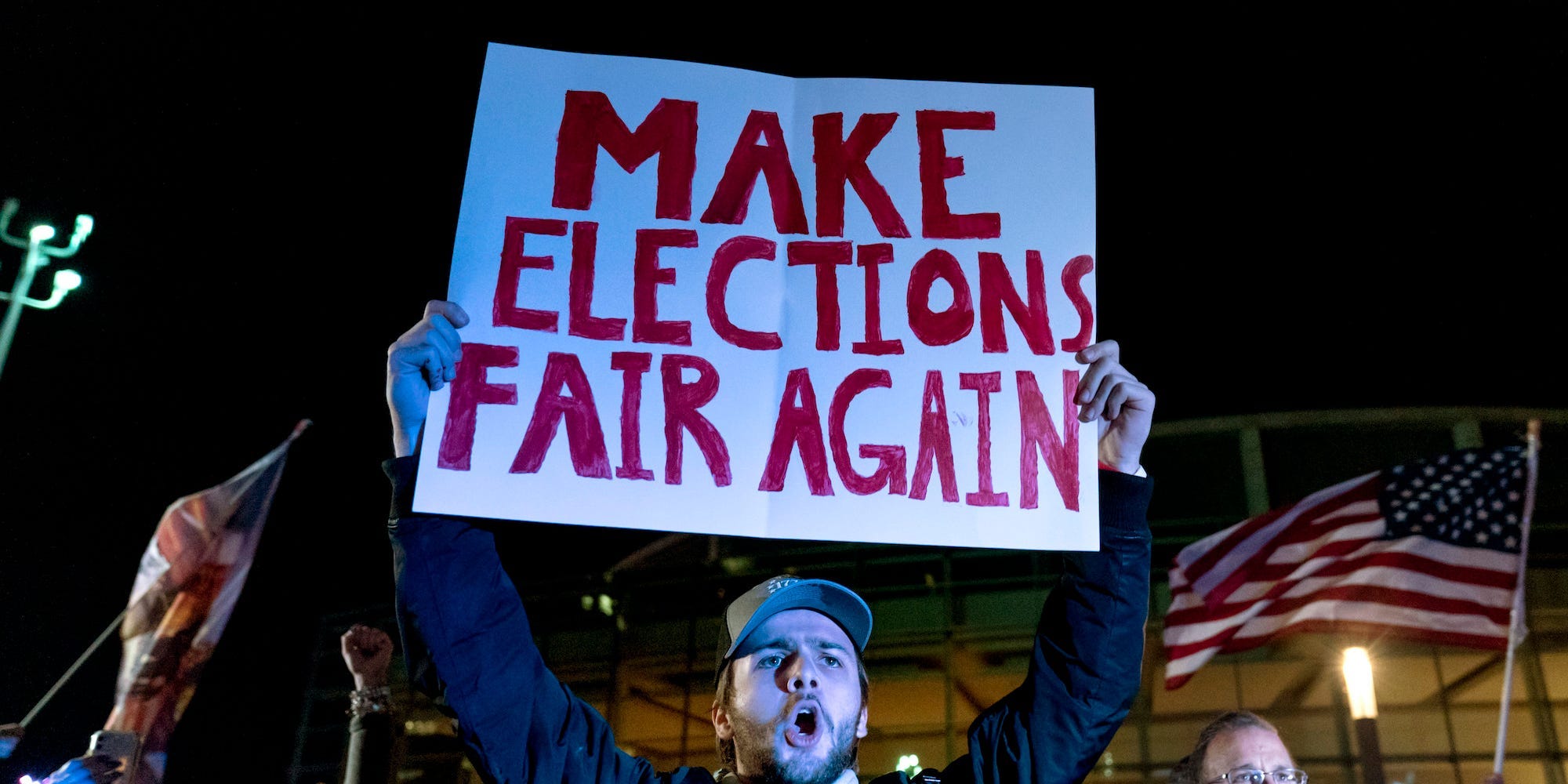
Paul Hennessy/NurPhoto via Getty Images
- A new FEC complaint accuses the Georgia Republican Party of campaign finance violations.
- Two watchdog groups say they illegally accepted in-kind contributions from nonprofit True the Vote.
- True the Vote publicly touted its partnership with the Georgia GOP on social media.
- See more stories on Insider's business page.
Two government watchdog groups have filed a complaint with the Federal Election Commission accusing the Georgia Republican Party of illegally accepting in-kind contributions from True the Vote, a nonprofit that engaged in election-related activities around the Georgia Senate runoffs.
True the Vote, a 501(c)3 based in Texas, has been active for over a decade. It has advocated for voting policy changes like voter ID laws and stricter voting regulations, organizing poll-watching operations and other grassroots efforts, and suing jurisdictions over the state of their voter rolls, and often partnered with large and well-known conservative organizations
In the complaint, filed Wednesday morning and first obtained by Insider, lawyers for Campaign Legal Center Action and Common Cause Georgia accuse the Georgia GOP of unlawfully taking and then failing to properly report in-kind corporate contributions from the group in violation of the Federal Election Campaign Act.
The FEC defines in-kind contributions as a "non-monetary contribution" to benefit a campaign or committee. Federal law, however, bans corporations (including both for-profit and non-profit organizations) from making such contributions to candidates or party committees or coordinating with them.
"True the Vote is prohibited from making in-kind contributions to political parties, and True the Vote is prohibited from coordinating political expenditures with parties, like the Georgia Republican Party," Brendan Fischer, director of Campaign Legal Center Action's federal reform program and one of the lawyers filing the complaint, told Insider. "The relevant legal standard is whether True the Vote spent money in connection with an election, and in some ways, that's a broader standard than what might apply to other entities."
The organization's open coordination with the Georgia Republican Party in its efforts to fund election-related activity, the complaint said, puts them squarely in violation of the law.
This isn't the first time True the Vote has been accused of such tactics. Over a decade ago in 2010, groups including the Texas Democratic Party and Texans for Justice Public charged in a lawsuit and a complaint with the Texas Ethics Commission that True the Vote made illegal in-kind contributions to the Harris County Republican Party in the form of recruiting partisan poll watchers.
"What we're hoping to do is to send a message that this activity does not belong in Georgia, this isn't actually helpful for voters, and it doesn't actually increase integrity or the trust value of our elections in Georgia," Aunna Dennis, Executive Director of Common Cause Georgia, told Insider. "We're pursuing this complaint because this is not activity that is legal federally, and it shouldn't take place in our state."
Representatives for the Georgia Republican Party and True the Vote did not immediately respond to Insider's requests for comment.

AP Photo/John Bazemore, File
'A pretty egregious violation'
Ahead of the January 5 dual US Senate runoffs in Georgia, True the Vote publicly announced a partnership with the Republican party, which was working to elect former Republican Sens. Kelly Loeffler and David Purdue, who are not accused of any wrongdoing in the complaint.
True the Vote's activities in Georgia included voter mobilization activity, funding an Election Integrity Hotline, training volunteers in signature matching techniques, coordinating volunteer monitoring of ballot drop boxes, and "other election integrity initiatives," the group announced December 14.
The organization was more than open about its coordination in those activities with the Georgia GOP. As the complaint lays out, the group announced their partnership in a press release on its website that quoted Georgia Republican Party Chairman David Shafer's praise of the group, promoted the partnership on social media, and touted it in fundraising emails to raise more money for the effort.
"This was a pretty egregious violation, and I've never seen one quite like it," Fischer said. "Typically the kinds of violations that we see would at least be harder to detect."
-True the Vote (@TrueTheVote) December 14, 2020
The group also spearheaded a largely unsuccessful campaign to challenge the validity of over 364,000 Georgia voters' registration statuses in the lead-up to the runoffs.
True the Vote bills itself as an election integrity group whose goal is to make elections more secure. Dennis told Insider, however, that the group's involvement in the flurry of voter registration challenges and lawsuits in Georgia, combined with their unsubstantiated claims of major fraud and illegality in elections, did anything but.
"I think that it was really damaging to election administration. It was a distraction, it was disruptive to having a fair, equitable balloting process. It really made the counties backlogged," Dennis said, saying that the organization's long-controversial methods of training volunteers to spot potential fraud led to more harassment of voters and headaches for election workers in Georgia.
Their press release stated that the group made a similar offer to provide election integrity-related resources to the Georgia Democratic Party, but the FEC complaint said that metadata from the site shows that the release was edited to add that information weeks after the fact.
"I think there's a number of ways that True the Vote and the Georgia Republican Party could have worked together without anybody ever detecting it, but they were very public about their partnership," Fischer said. "True the Vote was very public about what the purpose of their activities was. And that purpose, at a minimum, was in connection with the Georgia runoff election."
Even though True the Vote's activities didn't explicitly support one political party over the other or actively encourage Georgians to vote for particular candidates, "That's not the standard here," Fischer emphasized.
"Federal law is very clear, even after Citizens United, that any corporate expenditure made in connection with an election and in coordination with a political party is unlawful," he said.

AP Photo/David Goldman, file
True the Vote was active in the wake of the 2020 election
As former President Donald Trump escalated false claims of fraud and illegality in the 2020 election, True the Vote filed lawsuits in the battleground states of Georgia, Michigan, Pennsylvania, and Wisconsin. But the group voluntarily dismissed all of the suits within days of them being filed, citing "barriers to advancing our arguments, coupled with constraints on time."
Venture capitalist Fred Eshelman, who gave $2.5 million to support True the Vote's efforts to hunt down fraud in 2020, sued the group in late November for breach of contract and conversion, claiming that the organization went dark and failed to turn up any evidence of voter fraud after taking his money to fund the abandoned lawsuits. The organization's president Catharine Engelbrecht refuted Eshelman's claims in a statement to Insider at the time.
In late December, the watchdog group Campaign for Accountability filed a separate complaint with the Internal Revenue Service accusing True the Vote of running afoul of its 501(c)3 nonprofit status by explicitly engaging in political activity through its partnership with the Georgia GOP.
"This case touches on the fact that voter suppression and big money in politics are two sides of the same coin," Fischer said. "Efforts to limit the vote and to protect or expand the influence of secret donors, ultimately they're both having the effect of depriving average voters a voice in the political process."
